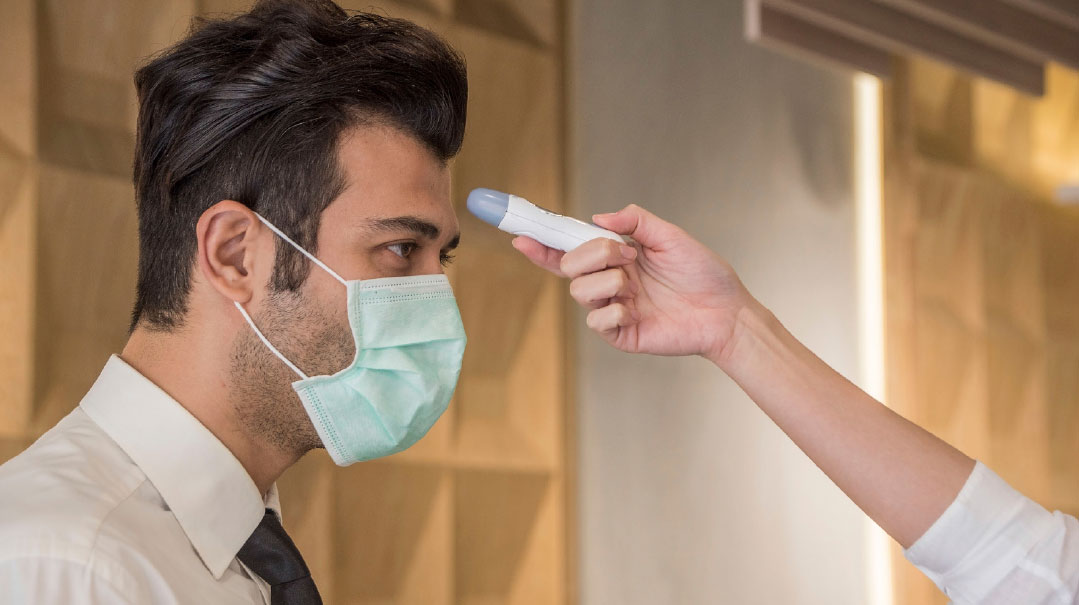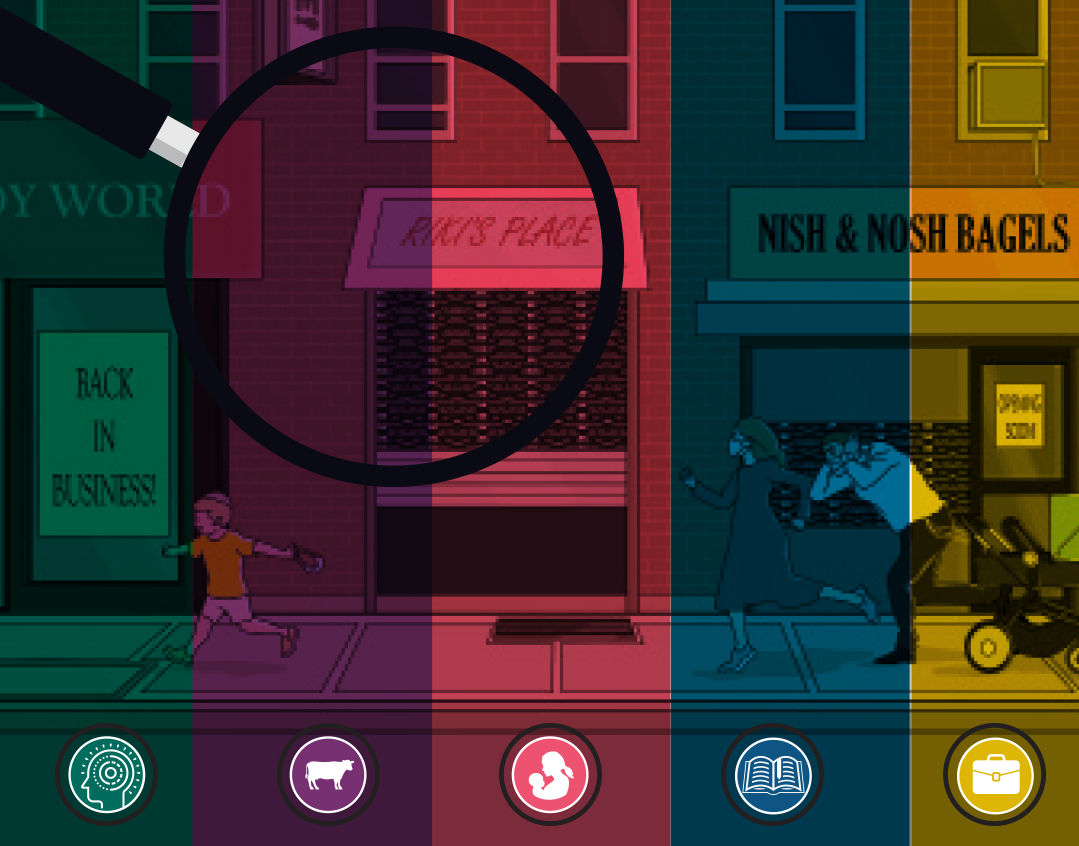Forced Apart, In It Together

The world as we know it, with all our 21st-century sophistication and innovation, has gone into a tailspin over an invisible germ. Is this the new normal?

Open or Shut?
Rabbi Ron Yitzchak Eisenman, Passaic, NJ
The news arrived on Shabbos afternoon in the middle of daf yomi:
The city of Passaic had decided to issue an advisory to all houses of worship to suspend prayer meetings.
One of the local city officials contacted me after Shabbos and pleaded with me to cancel all of our services.
“I cannot enforce it,” he admitted. “However, I hope you will comply.”
The thought of depriving 1,000 people — the average number of men who show up on a typical Sunday — of tefillah b’tzibur was frightening. On the other hand, the thought of playing some role in transmitting a potentially life-threatening sickness was inconceivable.
I was pulled in multiple directions.
“How could you even think of closing the shul? Do you know how Jews sacrificed their lives to daven with a minyan in the Warsaw Ghetto?”
“The entire virus thing is media hype! It’s all about nothing. Keep the doors open.”
“If we don’t daven in a minyan, how do you expect Hashem to help us?”
“Of course the shul must be closed. So people will daven alone. What’s the big deal?”
I thought about the lone son who is saying Kaddish for his father. And I thought about the older man from Lodz who has asthma, yet still comes to shul. I thought, and I struggled.
All of those I consulted said, “Rabbi, it’s your call. You’re the one at Ground Zero — it’s in your hands.”
Finally, it wasn’t a person with whom I consulted who granted me clarity; it was the Torah itself. “The Torah says: Desecrate one Shabbos for him so that he can observe many Shabbosos” (Shabbos 151b).
Tomorrow, minyanim will not take place. That is what the Torah demands.
Yet, it’s with the hope that the day after tomorrow and the day after that, we will once again all daven together.
No Game, No Plan
C.R., Jerusalem
In general I’m a very organized and structured person.
Not by nature, but by necessity. My son Ari is autistic and clinically hyperactive. Therefore every part of my day, week, and year must be structured with Ari’s needs and schedule in mind. Thankfully, he’s in a great school system that rarely has vacation and during the random off-days, we coordinate with a volunteer from Ezer Mizion.
So life bumps along. Until Motzaei Shabbos, when any semblance of normalcy was pulled out from underneath me.
Last week, when school was canceled for my other children, I took a deep breath and dealt with it. But I was relieved to know that even Prime Minister Netanyahu agreed that special-ed schools cannot afford to close their doors. Apparently, my relief was premature.
I can’t imagine that whoever passed the new law mandating closure of my son’s school ever parented a special-needs child. When the principal called to say he was closing, I challenged him.
“What about mental health? What about security at home? Who is going to take responsibility if my child has a meltdown and wreaks havoc in my home, causes harm to his siblings?”
He was sympathetic and apologetic, but stuck.
I’ve been Ari’s mother for close to two decades now. And I don’t think I’ve ever felt as helpless as I did last night hanging up the phone knowing I alone was going to be responsible for Ari for the next... how long?
Chaos is an understatement to describe the situation with Ari and all his siblings stuck under the same roof. During the time it took me to write the above paragraphs, Ari managed to get hold of the broom, chase his two-year-old brother around the kitchen, and knock the cover off a light fixture, which shattered all over everybody’s lunch.
Now I’ve got him wrapped in his weighted blanket on the floor next to my computer, and he’s systematically banging his head against the cushioned floor as he struggles to regulate himself.
I’m struggling to regulate my breathing and my thoughts, which are quickly spiraling out of control.
I never have Ari home without a game plan. But this is no game, and it seemingly has no plan or any foreseeable end. I guess that’s what gets me the most. I’m only halfway through Day One in the trenches, and I’m ready to surrender.
I’m davening so hard for everyone to stay healthy during this threat of corona. Please, can someone daven for me as well?
You Were Missed
Yosef Wartelsky, New York
What an odd Shabbos I just experienced.
The shuls where I live in the Five Towns and Far Rockaway area were closed this past Shabbos, as per the psak of Rav Dovid Feinstein.
A few weeks ago, the thought of going through a Shabbos without going to shul, even once, to daven with a minyan, to recharge, schmooze with friends, hear an energizing derashah after a tiring week, was reserved for someone who was stuck in a hospital perhaps. But for entire communities? It would have seemed incomprehensible. But this past Shabbos was just that.
I never thought I’d miss this integral ingredient of Shabbos so much.
Admittedly, I gained an appreciation for what my wife has to deal with at home while I’m away at shul blissfully singing Lecha Dodi on Leil Shabbos or Mi Kamocha on Shabbos morning, but I also gained an appreciation for all the people I never thought I’d miss.
I never thought I’d miss the extra-loud davener who usually grates on my nerves and was shocked that I missed the long Shemoneh Esreh davener who sits behind me, whose extended davening doesn’t allow me to take my requisite three steps back for a lot longer than I’d like. I never thought I would, but I missed hearing the complaints from the sweet fellow who just can’t handle when the rav’s derashah is three minutes too long. I missed the questions about whether or not we got the order of spoons for the kiddush, and the vigorous, friction-heat-inducing hand rubbing from the guy who is upset at me that the heat isn’t high enough.
I wished I could have said gut Shabbos to all the familiar faces and friends, and schmoozed with them during kiddush about important things, like which matzah is the thinnest or how we never would have taken seats before the adults back when we were kids. I missed trying to figure out what excuse I would give to my not-so-close friend for not being at the shalom zachar he made last night.
I missed making my weekly announcements after Mussaf, and inevitably forgetting something and getting told off for it. I missed watching our small, young shul dealing with issues that shuls all over the world are dealing with. Age-old issues like keeping tefillah passionate and newer-age issues like armed security guards. I missed the pure children who intensely look through the candy bag for a few minutes to pick the perfect lollipop for themselves, and their four siblings and eleven cousins who came for Shabbos.
Although part of me (the part that pretends to be a highly respected infectious disease professional) questioned the decision of some to make small outdoor minyanim over Shabbos, a much larger part of me marveled at the fact that, like a magnetic pull, these Jews simply can’t help themselves. Tell me to not shake hands, fine. Tell me to stay six feet away, b’seder. But not to sing Kabbalas Shabbos together — inconceivable!
I think the words that jumped out at me most this Shabbos morning, as my two-year-old son chucked Cocoa Puffs at me, were the simple words we say early on in davening, “praiseworthy as when we rise early and stay late in shuls and batei medrash…”
Most of all, I missed being able to daven to Hashem together with other Yidden, each with different expressions, decibel levels, and speeds — the way in which we sing to Him varies, but that produces the beautiful harmony of davening b’tzibbur.
Like all of the incredibly difficult and challenging times we’ve faced throughout our history, we will survive this one to tell the story as well. Whatever comes of all this wackiness, one thing is for certain: Hashem is watching and taking note of how much we are missing being with each other — and how much we miss getting together to talk to Him.
For me, one takeaway is certain: When I get back to shul and that extra-loud davener is doing his thing, I’ll remember how I hated the quiet davening in my living room.
Waiting Alone
Malky Berger
Every Shabbos, I visit the women in our local nursing home.
Over the years, they’ve become my friends — I value them for their wisdom, their wit, their sweetness or grit. Each one has a story and a special soul, and the hours I spend in their company enriches my own life.
Every Purim I prepare a pile of special mishloach manos for “my ladies” and spend part of the day distributing the packages at the nursing home. This Purim, I set out with my packages and my son, only to find the door locked.
“No visitors,” said the security guard.
“Corona. Dangerous.”
I gulped. What kind of Purim would these women have without any visitors?
“Can you just give them these packages?” I asked.
He shook his head. “No packages from outside.”
I schlepped my bags back home, thinking of the lonely women waiting in vain for their Purim cheer.
If you really care about them, you won’t visit them, I told myself. You’d want them to stay safe.
But what kind of cruel illness shuts helpless people inside their own homes, pitting their desire for safety against their very real need for company?
The Longest Pesach
Shlomo Scholnick, Ramat Beit Shemesh
Twenty years ago, I opened a travel agency with not a penny to my name.
Slowly but surely — and with lots of siyata d’Shmaya — my company, Travel Deal Israel, has blossomed into a world-renowned service that works to get the best possible rates and provide far beyond the basic hotel reservation. Many of our clients have been booking with us for years, and we’ve gained a name for guiding them toward the best decisions in booking their Israel accommodations.
My employees are hard-working, service-oriented, friendly, and helpful. Some have been with me since the very beginning. These women are supporting their husbands’ Torah study while they work hard to support their families. I, in turn, am proud to be supporting these very dedicated and devoted kollel wives and honored to be a part of their holy service.
On top of the general workload, from December through March we’re busy with Pesach reservations, either for our Kinar Tiberias Pesach program or for other hotels around the country.
My staff works tirelessly answering calls and emails, and meeting with clients to ensure each and every one is receiving top service.
Over the years, Israel has faced many challenging situations, and the tourism industry has struggled intermittently. Yet not once in all those years have I held back any salaries or let any of my staff go. Now, from one day to the next, the world has been thrown into a situation the likes of which we have never been dealt before.
What is happening now is beyond anyone’s control. Usually, at this time of year we’re busy finalizing the last few details of our Pesach program and tying up any loose ends; this year we are busy fielding calls and emails from concerned guests canceling their reservations.
We understand the concern of illness, of quarantine, and the fear of the unknown. We also understand the fear of financial loss. We understand because we’ve been hit very hard.
I am a firm believer that all that happens is for the best, though we may not understand, because we don’t see the larger picture. Hashem is showing us all that He is in control of the world in its entirety.
And I believe that just as He’s helped us get through all kinds of hardship before, He will once again help us through this uncertainty as well.
An Abrupt Close
Rav Shimon Isaacson, Rosh Yeshivah, Yeshivat Shaarei Mevaseret Tzion
Today was one of the saddest days I can remember experiencing in yeshivah.
As the longtime head of a yeshivah for post-high school American students in Israel, I’ve gotten used to the rhythm of the year — the way it begins, takes shape, and then ends on an emotional and inspirational climax. Usually, the entire last month is devoted to preparing our talmidim for the future as they head back to the United States, the majority to college.
But over the past week, as the restrictions here grew tighter in response to the spreading coronavirus — especially once they issued the ten-person rule — I had no choice but to urge our boys to go home. As a yeshivah numbering over 120 students, now we’ve reached the point where it’s impossible to practically comply with the Ministry of Health regulations.
And so our beis medrash is emptying out, boys are quickly packing and arranging flights, and everyone is left feeling not just anxious and confused, but also sad.
The sadness is palpable. There’s a lack of closure. They don’t know if they’ll be coming back after Pesach; none of us know what will happen in the near future. We’re working on setting up a virtual beis medrash online, and will do our best to create a seder hayom, with shiurim, mareh mekomos and a system for accountability — but, of course, it’s not the same.
Even the goodbyes aren’t the same; we can’t give that pre-Pesach-break schmooze or the deep-felt farewell hug, as we usher them back to an uncertain situation in chutz l’Aretz.
I think our boys first began appreciating the seriousness of what was happening last Thursday, when they heard the news from America that shuls were shutting down, and that a major sports league was canceling its season. That was a psychological shift for them. When I got up to make an announcement before Minchah, one of the boys spontaneously began a niggun, and before I knew it, the entire room had burst out in song — in Ministry of Health–approved, contact-free dancing.
For me, it’s been an emotionally wrenching time, as I’m called on to make new decisions with each government update. It helps very much that I’m part of a WhatsApp group with other heads of yeshivos and seminaries, so I can consult with my colleagues to make sure I’m acting in a way that’s sound. It also helps that I know my limitations — I’m not pretending to outsmart the Ministry of Health. I’m not going to be more machmir or more meikil than them. I just follow their guidelines.
This may sound surprising, but what helps me calm my own anxieties is actually being in frequent communication with the parents. I’ve been writing a lot of email updates, and I find that writing openly and honestly is very healthy for both of us. It calms the parents and is also therapeutic for me.
Over the years, I’ve led the yeshivah through my share of crises: wars and terrorist attacks, which can be more nerve-racking because of the randomness and impossibility to plan for them. On the other hand, those events don’t affect our daily functioning as a yeshivah and as we’ve seen, they can be over in a moment — suddenly a ceasefire is declared, and the next day, life goes back to normal.
With our current situation, we have no idea how long this will last, but normal doesn’t seem to be returning any time soon. There’s no normal in our daily yeshivah life, either. With social distancing, we can’t have our regular chavrusas or our regular beis medrash. And, unlike wars and attacks which are, unfortunately, not strangers to Israel, right now our boys feel like they’re heading back to a more dangerous place than they’re leaving.
However, if there’s one takeaway I’ve been emphasizing to the talmidim, it’s that this is the time to realize that we’re in Hashem’s Hands. We can do all the hishtadlus we want, but the results are never in our control.
If I can find a silver lining, I think the suddenness of this all, the fact that their year may have come to an abrupt close, has made the talmidim appreciate in a very real way how important and valuable their yeshivah experience has been for them. This past Shabbos, they sat around the room and each one shared a specific thing they’re grateful for. As they faced the fact that their year has been cut short, that they may not come back after Pesach, they realized just how much they love the yeshivah and how much they’ve grown.
All Who Are Hungry
Dina Soloveitchik
In September 2013 my husband and I packed up our family
and moved from London to Pinsk, Belarus to serve as teachers under the Yad Yisroel organization, an outreach organization founded by the Rebbe of Karlin in 1989.
It took us some time to get accustomed to daily life in Belarus. One of the biggest logistical considerations here is kosher food. The poverty in Belarus is staggering, and along with kiruv, chinuch, and taking care of many orphans, our organization typically feeds about 180 people. Come Pesach, that number goes up to 250.
At this point we’ve perfected the art of bringing kosher food to Pinsk: we have the merchandise shipped to a storage facility in Poland, and then we bring it over.
This past Motzaei Shabbos, as we prepared to transport the three tons of waiting food to Pinsk, we were informed the border had been closed. We started scrambling, trying to arrange an alternate route through Lithuania — only to learn that the Vilna border had been closed too.
So there we were, the owners of a huge pallet of food — including all our vital Pesach food: matzos, oil, salt, grape juice, wine, and basic cooking ingredients — but with no way to access it. What could we do?
My husband and another man scheduled a meeting with Rabbi Moshe Fhima, the head of Pinsk’s Jewish community, hoping to find a solution. Rabbi Fhima listened to the whole story, and then stood up.
“That’s it,” he said. “You’ve done everything you can, you’ve done your hishtadlus. Now it’s time to go home. We have to just trust that HaKadosh Baruch Hu is going to help us.”
It was hard to hear, but he’s right. We came to the realization that at some point you just have to stop scrambling and leave it up to Hashem. My father-in-law, Rav Shmuel Chaim Soloveitchik, always says, “V’haboteiach b’Hashem, those throughout this whole matzav who trust Hashem, chesed yesovevenu, HaKadosh Baruch Hu’s chesed will surround them.”
Even before this incident, we’ve learned to sense Hashem’s presence and guidance on a day-to-day basis. Here in Pinsk we’re so far away, so removed from the rest of the world, that we can’t help but feel our reliance on Hashem. Sometimes I’m missing a certain ingredient, and a madrichah happens to drop in and say, “Dina, I’ve got leftover chocolate chips, do you need some?” and I see how Hashem is looking after me.
My husband keeps telling me the same Hashem Who gave us this virus knows how difficult it is and He knows our situation. And that’s the same HaKadosh Baruch Hu we’ve got to rely on to get us kosher food for Pesach.
So if you ask me if I’m worried, the answer is no. We can only do our bit, and we’re 100 percent sure that Hashem is going to help us. He’s going to bring us to Pesach and He’s not going to leave us empty-handed.
Rerouted
Mrs. Channa Flam, Principal of Bais Yaakov Seminar, Jerusalem
Like the rest of the world, when this whole thing first started, I thought, this has nothing to do with me.
And then I watched it spin out of control.
It first began to concern me when I realized it might affect our Poland trip. Every year, we take the girls in our seminary to Poland the week before Pesach vacation, and it’s one of the highlights of their year. In fact, much of the year is spent preparing for it. We do a Shorashim project, a Holocaust unit, and a unit about Sarah Schenirer and the origins of Bais Yaakov. So it was not easy to announce to our girls that the trip would be postponed. I used the word “rescheduled” because I was confident it would all pass.
Oh, how much can happen in one week.
By the time everyone returned after Purim vacation, I knew everything was different. The person I’d appointed to head the upcoming Shabbaton came to me to talk about her plans. I looked at her and said, “I think we’ll be chartering a flight back to the US today.”
She was shocked, but I was convinced something big was about to happen that night. The government was promising a major announcement, and the talk was that schools would be shut down.
I had a little more time to get used to this idea than others. Over Purim, my assistant principal, who lives in Telshe Stone, called to tell me she was put in quarantine. I suddenly realized something that had been niggling at me: A dorm is not a place where you can be quarantined. Not practically, and not legally. If one of our girls needed to be placed in quarantine, we did not have the ability to carry it out.
I asked daas Torah what to do about this, and the rav told me, “You’ll have to tell the girls that they’re responsible for finding their own place to be quarantined.”
But how could I do that? Where could I tell them to go, to their elderly grandparents? To family friends, who had ten children of their own? I’m a realist, and I saw which way the wind was blowing, that things were starting to spiral out of control. So that Thursday, as soon as the news went out that the government would likely be closing educational institutions, I knew it was time to spring into action.
Together with Rabbi Zecharya Greenwald of Meohr Seminary, we chartered a flight, since there were no flights available otherwise to send all of our girls home. It involved a tremendous amount of logistical work, not to mention laying out hundreds of thousands of dollars. But I felt it was the only responsible thing to do.
When I told the girls they’d have to go home, they started crying from shock. The charter flight was scheduled for Sunday, and on Motzaei Shabbos, we had a special sendoff event. It was a very emotional gathering. I spoke about how Hashem is showing us Who pulls the strings in this world. Our assistant principal Skyped in from her quarantine room to give the girls chizuk. She said, “Keep washing your hands — but don’t forget whose Hands we’re in.”
In the middle of our event, we heard the new government announcement: Public gatherings were now restricted to ten people. Now I knew I’d made the right decision.
By the next morning, we had buses loaded up with suitcases, as 90 of our 130 girls headed to the airport for the charter flight. (The remainder made alternate flight arrangements; by now we’ve chartered two flights and there are two more in the making.) Coordinating this meant three sleepless nights for me, but I was so glad to know that our girls were taken care of — and so were their grateful parents.
We’re planning to work out a Zoom phone system to continue giving classes in the US, but I’m still not giving up hope that the girls will be able to come back after Pesach. Hashem can bring a sudden yeshuah. He can cause a vaccine to be developed quickly, or bring warm weather that will kill the virus, or…
But HaKadosh Baruch Hu doesn’t need me to give Him ideas. As I told my girls before they left, as the Chovos Halevavos says, when Hashem makes it so clear that we are in His Hands, the first thing we must realize is that nothing is difficult for Him. We are in His Hands, and He will show us the way
Desperate for Dignity
Gedalia Guttentag
When history looks back on the Coronavirus crisis, the humble toilet roll will undoubtedly loom large. Behavioral psychologists will write popular works, think tanks will conduct research, and historians will — pardon the pun — follow the paper trail for first person accounts and to study the wealth of toilet roll-related memes.
All will be occupied by the same question: Why, when pandemic gripped the 21st-century world, did millions of people react by stockpiling — not staples like pasta and rice — but WC supplies?
When people feel vulnerable — threatened, say, by an approaching hurricane — they stockpile illogical amounts of cans and candles. That’s what you might call the “normal irrational.”
But then there’s corona. Impervious to medical science, remorseless in its advance, destroying school, work and social contact — it seems to threaten our very sense of civilization. With the fabric of normal life under attack, people react by trying to guarantee the minimum of civilized life. As a weapon to fight weeks-long quarantine and loss of human interaction, toilet rolls aren’t much. But at heart, these toilet rolls represent the basic human dignity that modern hygiene affords, and the last semblance of control amid a collapsing world.
You don’t have to be an elephant to remember the last time that a whiff of panic hung over the developed world, and we all grasped for straws.
Just twelve years ago, the international financial system was rocked by the credit crunch that followed the collapse of America’s sub-prime mortgage market. As governments rushed to shore up banks, there was a feeling that the pillars of civilization as we knew it were swaying.
I will never forget the fearful tone of news commentators as they worried about whether London, a world finance center, would survive.
In the aftermath of that crisis I wrote something that only seems truer today. American economic historian Peter Bernstein in his Against the Gods: The Remarkable Story of Risk defines the modern era as beginning when people learned to manage risk.
For much of history, man was defenseless against the elements. If rain didn’t fall, crops would be ruined. A storm at sea would sink a ship. If a person fell ill, there was not much to do other than pray. But then came the modern era.
Science, writes Bernstein, has negated the risks that once threatened us. If rain doesn’t fall, we have irrigation techniques. Our ships are strong enough to survive virtually any storm. The wonders of medicine mean that we live longer, healthier lives than ever before. The modern era, it seems, has freed us from our dependency on G-d. Where once we had prayer, we now have technology.
A piece of Michtav MeEliyahu (Vol. 3, p. 205) now making the rounds crystallizes Chazal’s response to this attitude. Rav Dessler quotes Midrash Rabbah as saying that the downfall of Malchus Edom will come about when the foundations of normal life collapse: “Then it will become clear that Edom’s boastful pride in advancing to conquer Creation, brings only to disaster when life is emptied of all spiritual content.”
In shorthand, that’s coronavirus. If the very idea of human dependence on G-d is unthinkable, when history’s most advanced society is totally oblivious to G-d’s existence, then financial meltdown or scenes of corona-induced toilet roll frenzy become tools in the hands of Hashem to gently educate us.
Cherish Your Table
Dovid Bashevkin, Teaneck, NJ
I’m a terrible planner in general, which is why I have been blessed to be surrounded by women throughout my life who are amazing planners.
My mother saw the threat of quarantine coming a month ago (although to be fair, her other apocalyptic visions — and there have been many — have not panned out).
My wife started getting serious about two weeks ago. She bought enough cheese to feed most of Teaneck. I grew up in a home where stocking up on an inordinate amount of string cheese was a normal coping mechanism, so when my wife spent several hundred dollars on shredded cheese, it felt right. Every half hour, I yell out to my wife, “Do you know if we have any cheese left?”
Time moves differently without school or shul. Once the schools and shuls in Bergen County closed suddenly, we were all drifting. It felt like an entire town went through a midlife crisis all at once. How long has this been going on, two days, two months? But then we had Shabbos.
We all needed this last Shabbos. After so many WhatsApp updates, so many announcements, policies, reminders — now there was quiet. No guests, no playdates, no minyan, no kiddush. Just us. Just family.
Without a shul, without a school, our home has retaken its rightful place as the center of Jewish life. Honestly, I’ve always felt it should be here. I didn’t know how hard it would be watching kids a full day, but I never felt fully comfortable with the oversized influence our amazing institutions have in raising our children. The last few days have turned the clock back on that by over a century. The kodesh hakodoshim of Jewish life, I’ve been starkly reminded, is the home. And if I can’t build joy, sweetness, laughter, holiness, and growth in my home in Teaneck, it is unlikely any institution will ever be able to do it for me.
I remember once eating a Shabbos meal at Reb Dovid Lichtenstein’s house. He’s a well-known businessman, author, and host of the Headlines podcast. He stopped in the middle of the meal and asked why the zemer “Baruch Keil Elyon” describes Shabbos as a “minchah al machavas”? The minchah is an impoverished offering. Why not describe Shabbos as a more extravagant korban?
He asked everyone to look around. We were sitting around, maybe thirty guests, amazing food, wines, Chimay Ale (Reb Dovid insisted this is the best ale — I nodded along like I drink ale), and said, “I want you to know it wasn’t always like this.”
Sure, he’s extraordinarily financially successful now, but he reminded us there was a time that Shabbos was simpler. The warmth of Shabbos, the zemer reminds us, needs to be felt not just around an extravagant table, but even in times of simplicity and interiority.
This past Shabbos was a machavas Shabbos. You don’t need to host big meals with lots of friends and family to discover the warmth of Shabbos. Learn to cherish the machavas Shabbos. This past Shabbos, we did.
Wherever the Wedding
S.T. Agam, Ramat Beit Shemesh
Aweek ago, coronavirus was already a thing here in Israel.
But neck-deep in the preparations for my daughter’s wedding, I just threw a few extra bottles of hand soap into our supermarket wagon and plodded along. There was so much still to do! It had been a whirlwind few weeks since our daughter’s vort, but we were determined to pack in this wedding before Pesach. Stoically, we told ourselves: “No matter how nutty things may get — we’re up for the challenge!”
Turns out, we had no idea.
The last of our drunken Purim guests have barely stumbled out the door before the doomsday headlines hit us, and suddenly I’m the one whose world is spinning.
This is crazy. Crazy. The Health Ministry will only allow one hundred guests?
Just the chassan’s immediate family and ours — siblings, spouses, parents and kids — are (ben porat Yosef) over one hundred. I’m stumped, until I realize we can stagger the guests.
On Motzaei Shabbos, we’re hunkering over our lists when my son calls.
“You heard the latest?”
“What latest?”
“They’re limiting gatherings to a maximum of ten people.”
He’s kidding. I know he’s kidding. Until I realize he is dumbfoundedly serious.
I hand the phone to my husband and stare at the ceiling. Breathe.
Suddenly, it all seems hilarious. I rush into my daughter’s room and pull her off her bed, explain what’s happening. I grab her hands.
“What, Ima? What?!”
“Come dance!”
Her younger sister joins us, and another, and we’re four dancing in the cramped little space between the door and the foot of her bed.
“I don’t believe it!” the kallah says. “It’s happening just like I said, remember? Weeks ago, you were wondering how we’d manage to pull off a wedding so fast. And I said, it’s okay, all we need is the chassan and a few eidim, and we can make the chuppah on our porch…”
You know that old party game with the bar of chocolate and jumble of clothing?
You’ve got less than a minute to don hat, gloves and scarf before you start carving the chocolate and munching on it. But the music gallops far too fast, and by the time you manage to untie that scarf, it’s time to relinquish the role to the kid on your left.
Now, no matter how many knots we think we’ve finally untangled, down goes the gong and it’s time to start over. Scramble the cards. Line up your pawns. Re-think your strategy. Again.
The wedding is in ten days’ time.
Ten guests.
Think.
Bride’s parents. Siblings. Bride. That brings us to eleven. What about the mesader kiddushin? And the groom?
Ten Guests. Think.
Who do we invite? And where do we invite them to, in a world where simchah halls are shut? Then there’s the caterer — will he still come? Do we still bring a photographer? And what do we do for music?
I think back to the past few weeks and the heated debates we held around our supper table. Things that just a few decades ago were still considered fancy are now the new normal. A monstrous list of “must haves” that climbed so cunningly onto society’s lap and made itself so comfortable, that even when you want to shake it wildly, it refuses to budge. Gown rentals. Floral backdrops. Be-ribboned chairs and four-course meals.
I admit it. For all my wishing things could be different, and as much as I tried to keep things simple, even I was carried away.
Until, in one of recent history’s most awesome displays of Hashem’s majesty, all our plans, all our lists — along with those of an entire planet — are sent into a tailspin by one of the tiniest organisms ever created.
Still, even sans trappings, and even though we’ll greatly miss sharing our joy with our friends, the simchah must go on. So, when my cousin phones early this morning with a winning solution, there’s a visceral sense of relief.
“Why don’t you hold the chuppah in our backyard? It’s big, it’s private and it’s outdoors. Let the family spread out over the lawn, and there’ll be far less risk of infection.”
Bingo. I’m finally making progress with that chocolate bar.
And so I start a new round of phone calls to re-align our game pieces, and make sure we proceed with the show.
I know nothing’s a done deal until I’ve walked my daughter to the chuppah and have heard the shatter of glass. But maybe not? Maybe we’ll dance together, instead, at the greatest simchah of all time? Maybe our joy will finally be complete.
And perhaps, just perhaps, shattered glass will soon be a thing of the past.
(Originally featured in Mishpacha, Issue 803)
Oops! We could not locate your form.













